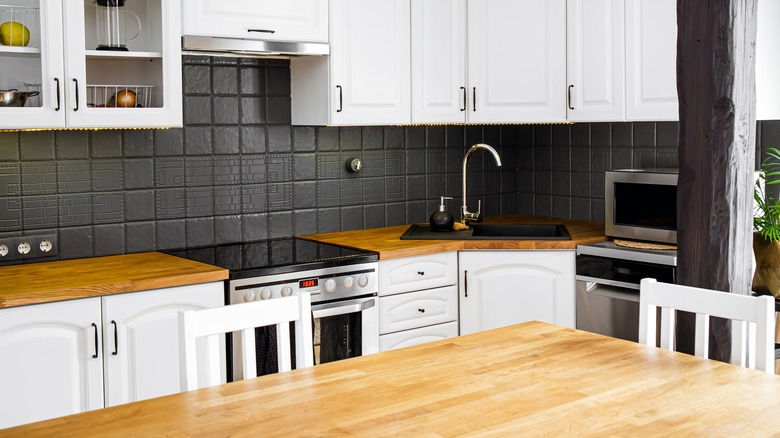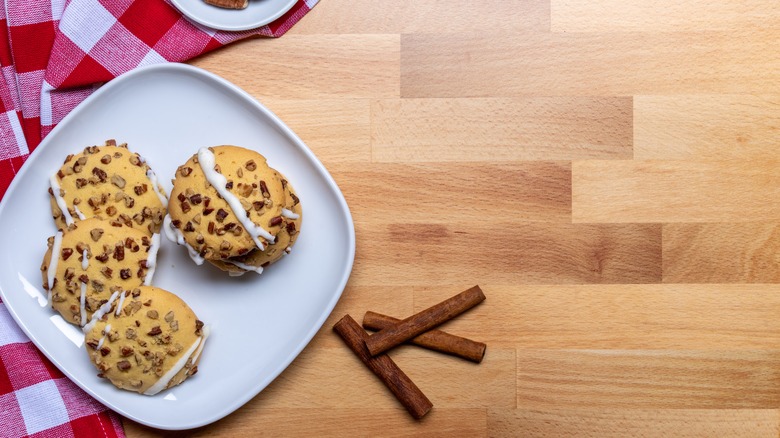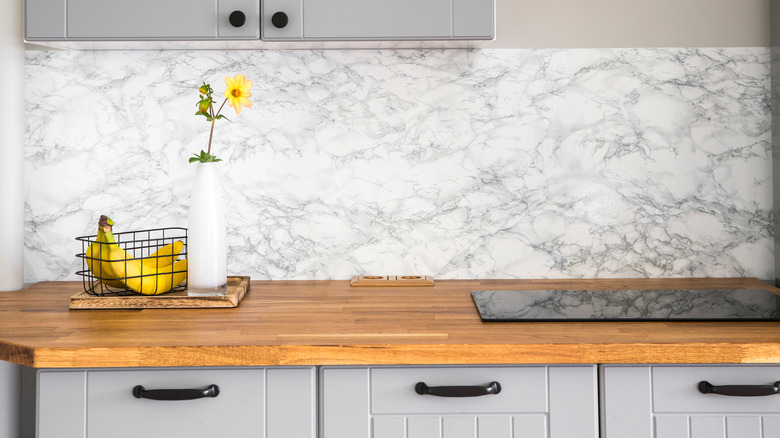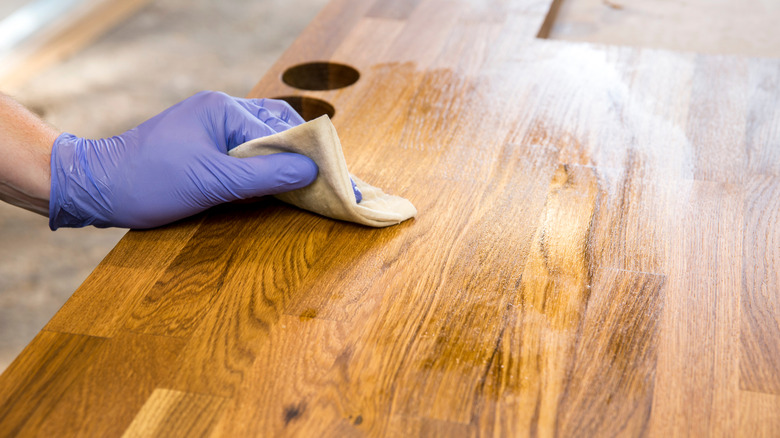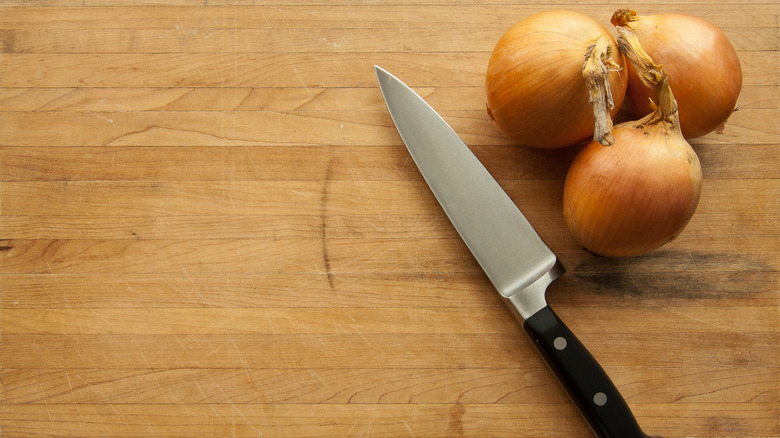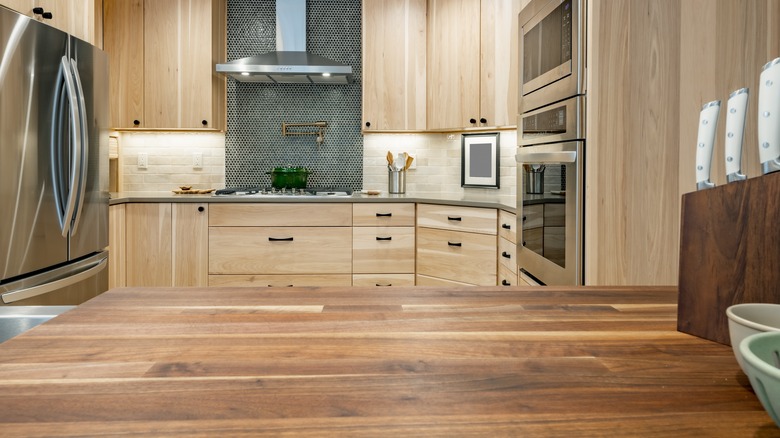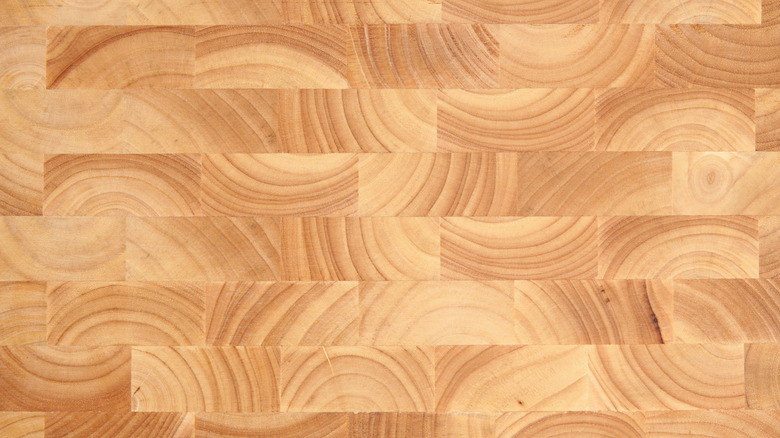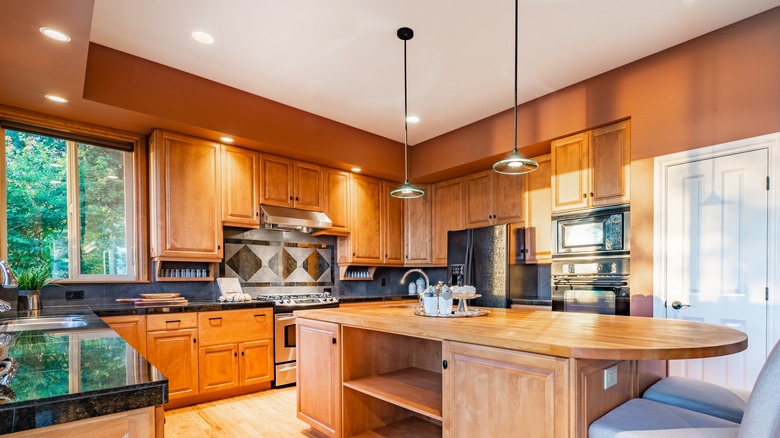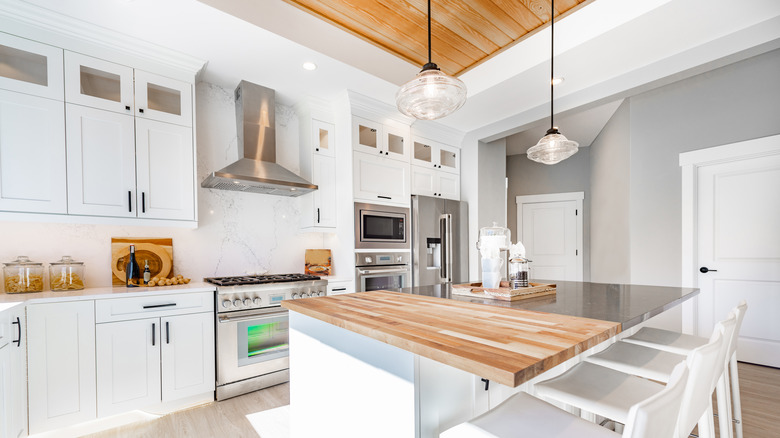Myths About Butcher Block Countertops That You Should Stop Believing
If you're getting ready to redo your kitchen, there are many different countertop materials to consider. However, one material that often gets overlooked in these decisions is butcher block. When people think "wood," they think "fragile," especially when they compare it against sturdier stone options, such as granite and quartz. Considering how we're instructed to treat our wooden furniture, it's a fair assumption. After all, you can't leave a glass of water on a wooden side table without leaving a ring, and using the wrong cleaning products can stain a credenza. So how can wood stand up to the mess and splatter that comes with a kitchen? It seems like you would be living with permanently stained countertops right from the get-go.
But as it turns out, that's a butcher block countertop myth. These particular countertops don't stain easily and are no weaker than their stone countertops. After all, marble discolors quickly, and slate is notorious for flaking and chipping. Here are all the butcher block countertop myths you need to stop believing so you can make an informed decision.
Butcher block countertops hold germs and bacteria
We've all heard it. Butcher block countertops harbor germs, making them unsanitary and unsafe. However, this is just a myth. Yes, wood is porous, but as long as you take proper care of the countertops, they should remain a sanitary place to prepare food and take care of other cooking-related tasks.
If you want to keep your butcher blocks sanitary, you will need to take care of them and clean them after use, but this is not different from any other materials. You can't just put a raw steak on a quartz or granite countertop, move it, and expect the area where the steak was to be free of germs or bacteria. With butcher block countertops, you want to ensure that the model you choose has a water-resistant coating. This will prevent bacteria from seeping into the wood itself. Then, after you use the countertop, clean it with either soap and warm water or vinegar and water.
Butcher block countertops are not water- or heat-resistant
There are also a lot of rumors going around claiming that butcher block countertops are not water- or heat-resistant, but these are also myths. Let's start by considering why it's a myth they're not water-resistant. Yes, an unsealed countertop will allow water to penetrate the wood. The trick is to add a water-resistant finish to make it less porous. Several food-safe mineral oil products will form a barrier between the wood and whatever you put on the countertop. Then, you simply need to reapply a new coat of the sealant about twice a year to keep your countertop protected; nothing too difficult. While it's true you can't leave standing water on butcher block counters, or else they'll warp, the same is true for stone. Marble is susceptible to permanent water stains. Like marble, you must wipe down any standing water on butcher blocks to protect them from damage.
Now, let's look at why not being heat-resistant is also a myth. The truth is butcher blocks offer about the same level of heat resistance as other materials. It isn't a good practice to move a pot off the stove and directly onto a countertop, regardless of what material it is made from. Putting a hot pot on a stone counter may cause it to discolor or crack, and the heat could cause laminate materials to peel. With butcher block countertops, if a hot pot leaves behind a mark, you can repair the countertop and get rid of the "evidence" with some sanding and re-sealing. Similar quick fixes aren't really an option with other materials.
Butcher block countertops require too much maintenance
Many people also incorrectly believe that owning a butcher block countertop means spending a lot of time maintaining and caring for it. This isn't true, however. Butcher block countertops do require some maintenance, but it isn't anything that's going to consume tons of your time and doesn't differ much from what you should be doing to take care of other materials. When you have a butcher block countertop, one of the most important things you can do to keep it looking and performing its best is to reseal the surface. Depending on how much you use your countertop, this task should be completed about once or twice a year.
In addition to being easy to maintain, butcher block countertops are also easier to repair than other materials. If your countertops get any dings or scratches, you can sand them down and apply a fresh coat of sealant. Compare this with the prospect of trying to repair a cracked or chipped stone countertop.
Butcher block countertops will get scratched and look unattractive
Another common fear that stops many people from discovering the wonder of butcher block countertops is that they will easily get scratched. Consumers worry that their countertops will end up looking unattractive and become an eyesore rather than a beautiful focal point in their kitchen. While they are softer than stone and will get knicked easier, this is no less true for stone like slate. The chances of scratching a butcher block countertop by sliding something unfinished over it are about the same as scratching a countertop of a different material. You need to be careful with this regardless of the material you choose.
Even if you want to cut food directly on your countertop rather than using a cutting board, you can take steps to keep scratch marks to a minimum. Using a food-safe and scratch-resistant coating will protect the natural wood against scratches. And, as shared above, if some scratches show up over time, you can just sand down the finish and reapply the sealant to get your countertops back to looking their best.
Butcher block countertops don't last very long
Concern over how long a butcher block countertop will last is another reason why some homeowners decide not to have them installed in their kitchens. In reality, however, the lifespan of butcher blocks is actually pretty similar to several other materials. They can last about 20 years, which is on par with laminate and cultured marble. While natural stone, tile, or concrete countertops may last a good deal longer, those made from resin may only last about half as long as a butcher block countertop.
However, it is important to note that you'll have to give your butcher block countertop proper care if you want it to last for 20 years. This means protecting the surfaces with a food-safe and water-resistant sealant at least once or twice yearly. Sanding down scratches and stains will also help it look pristine for longer.
There is only one type of butcher block countertop
If you thought all butcher block countertops were the same, think again. First, all butcher block countertops are not made from the same type of wood. While many are made from maple, others can be made from red oak, cherry, or bamboo. Zebrawood, wenge, and other sustainable and more exotic wood options are also available.
There are also three different types of butcher block countertops: edge grain, end grain, and face grain. The type you'll see most often is edge grain. Long wooden boards are connected together, with the narrower sides comprising the countertop surface. This design makes an edge grain countertop very stable and can hold up well to repeated use.
If you're looking for a higher-end butcher block countertop, you might want to consider an end-grain model. Made using several rectangular boards connected together, an end-grain countertop is the strongest type you can find. With the grid-like design of the surface, these countertops are also great at making it more difficult to see any scratches or imperfections. You can also find face-grain butcher blocks, but you are less likely to want this material for a kitchen countertop. Because the blocks are made by connecting boards laid out flat, they are more likely to show cut marks and scratches.
You cannot mix butcher block countertops with other countertop materials
Suppose you like the idea of having a butcher block countertop for prepping food and slicing ingredients, but still prefer the overall look of granite or quartz for the rest of your kitchen. In that case, no rule says you cannot mix and match different materials. It is perfectly acceptable — and attractive — to install one butcher block countertop and use a different material for the rest of the surfaces. Mixing and matching will allow you to consider several factors, such as how you plan to use the countertop and the colors and patterns that will bring your design vision to reality.
You can truly design your kitchen to match your specific needs and preferences. When paired with natural stone, a butcher block countertop can bring some rustic or farmhouse charm to the space. The contrast between the two materials will draw attention to their individual beauty and how they each contribute to the overall design.
Butcher block countertops cost too much
Are your concerns that butcher block countertops are too expensive holding you back from having them installed in your kitchen? While butcher block countertops are not the cheapest option out there, they are also not the most expensive. You can expect to pay between $55 and $200 per square foot. This is more expensive than materials such as laminate, slate, and engineered quartz, but it is in line with the price range for granite and marble countertops.
When considering butcher block countertops and deciding if the investment is right for you, remember that they are easy to maintain and that you can even sand down the finish to bring your countertop back to like-new condition. You can't say the same for most other materials. To help you decide whether they will be worth the investment, You'll also want to weigh some of their other benefits, such as the ability to use them as a cutting board and the unique charm and appeal they will add to your kitchen. In the end, it depends on what you value the most.
